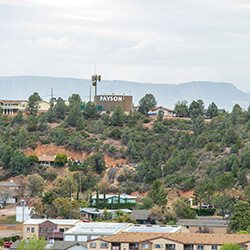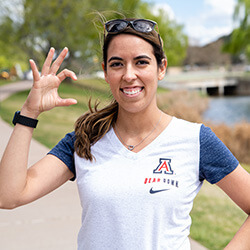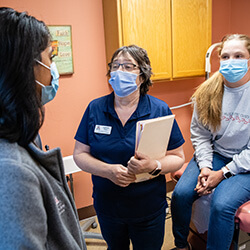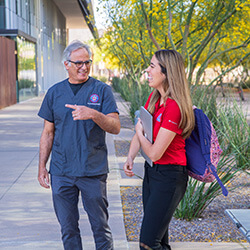Medical Student Makes Longitudinal Impact in Rural Community

The clerkship was created through a partnership between the Rural Health Professions Program at the college and the MHA Foundation to address the physician shortage in the state of Arizona — more specifically, in rural communities.
The third year of training at the College of Medicine – Phoenix includes rotations at the college’s nine clinical partners across the Phoenix metro area. Students engage patients that they may never see again after their initial encounter.
In contrast, students participating in the Rural Health LIC live and work in Payson, obtaining hands-on experiences in underserved communities with an emphasis on longitudinal patient care. They develop medical skills — and relationships — by treating some of the same patients over the course of the clerkship.

“I really didn't know too much about the LIC until my friend, Brett, told me that I should apply. He knows my interests and said it would be a great program for me,” Tapia explained.
Tapia then reached out to Dr. Cartsonis, director of the college’s Rural Health Professions Program and an associate professor of Family, Community and Preventative Medicine.
“Payson, like other rural settings, does not have a deep bench of medical professionals,” said Dr. Cartsonis. “Doing clinical training in these environments offers students a broad range of engagements with patients, and their efforts are noticed.”
“One of the values that I look toward in my future as a physician is developing longitudinal relationships with patients,” Tapia said.
Tapia had an incredible experience in delivering a newborn baby as part of her obstetrics and gynecology rotation. The expectant mother was experiencing high blood pressure and was admitted to the hospital where Tapia assisted in the C-section delivery. Tapia mentioned her interest in pediatrics as a specialty to the patient’s pediatrician and was invited to evaluate the mother and newborn at follow-up appointments.

Tapia participated in evaluating the mother the day after delivery, helped with the newborn’s well-check appointment and the circumcision procedure. Six weeks later, she evaluated the mother at their postpartum appointment.
“Traditional medical student classes are set up so that they’re only studying one subject for 4-6 weeks. In the LIC it’s competency- and continuity-based, so a student could be in the emergency department treating a patient with a gallbladder issue, accompany them into surgery and follow up with them after the surgery,” shared Judith Hunt, MD.
Tapia witnessed the lack of health care resources in rural communities. She assisted a patient with significant liver failure who urgently needed a therapeutic procedure. The radiologist was not due back in Payson for another 10 days, too long to wait given the patient’s condition. “I felt stuck — in that, I couldn’t help the patient sooner,” said Tapia.

“I feel like this is something you would experience during residency, since you have continuity clinics, but the traditional medical student’s experience is too short of a time to really get those follow ups,” concluded Tapia.
The Rural Health LIC is expanding to meet the need for medical professionals in rural communities — and students’ interest in these hands-on learning environments. The Gila River Indian Community and Flagstaff will welcome medical students in summer 2022, more than tripling the number of participating students from three to 10.
About the College
Founded in 2007, the University of Arizona College of Medicine – Phoenix inspires and trains exemplary physicians, scientists and leaders to advance its core missions in education, research, clinical care and service to communities across Arizona. The college’s strength lies in our collaborations and partnerships with clinical affiliates, community organizations and industry sponsors. With our primary affiliate, Banner Health, we are recognized as the premier academic medical center in Phoenix. As an anchor institution of the Phoenix Bioscience Core, the college is home to signature research programs in neurosciences, cardiopulmonary diseases, immunology, informatics and metabolism. These focus areas uniquely position us to drive biomedical research and bolster economic development in the region.
As an urban institution with strong roots in rural and tribal health, the college has graduated more than 1,000 physicians and matriculates 130 students each year. Greater than 60% of matriculating students are from Arizona and many continue training at our GME sponsored residency programs, ultimately pursuing local academic and community-based opportunities. While our traditional four-year program continues to thrive, we will launch our recently approved accelerated three-year medical student curriculum with exclusive focus on primary care. This program is designed to further enhance workforce retention needs across Arizona.
The college has embarked on our strategic plan for 2025 to 2030. Learn more.